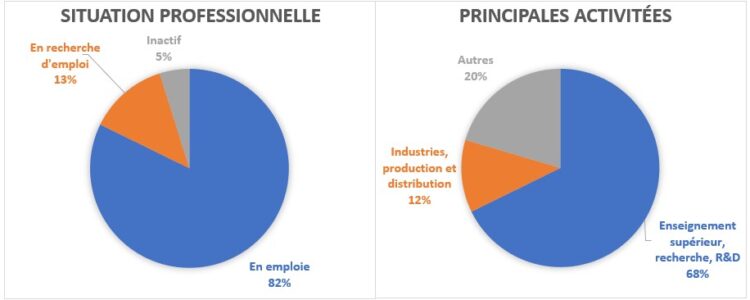While doctoral academics lead to a level of excellence in a specific scientific field, they also enable you to develop a wide range of professional and personal skills.
The USMB Doctoral College offers training courses to help doctoral students better define their career plans, acquire tools to help them evolve professionally and develop their personal qualities in a professional context.
This commitment to helping doctoral students find employment is reflected in the involvement of researchers from various research organizations in the academics program, as well as a partnership with the Club des Entreprises de l'USMB.
In addition, doctoral students benefit from the support services offered by the USMB's Bureau d'Aide à l'Insertion Professionnelle (BAIP):
" Need help defining your career plan, building your application tools or preparing for a recruitment interview?
Our advisors are with you all year round. Don't hesitate to contact us to arrange a personal meeting. "
main markets
Below are a few details on the main career options available after your doctorate, but these remain possible options, among many others...
Presentation
The work carried out during the preparation of a thesis constitutes a first professional experience within a research center or laboratory. It is possible to deepen and validate your research through post-doctoral studies.
A postdoctoral position is therefore a fixed-term job that enables a young doctor to carry out research that differs from that of his or her thesis, expand his or her publications and diversify his or her CV with a view to recruitment by a university, institute or company.
Universities and research centers (both public and private) offer postdoctoral positions and publish their vacancies on their websites.
Postdoctoral work abroad is an added bonus, and an excellent way of discovering a new culture and even a new research theme. It's a widespread experience internationally.
Temporary teaching and research assistants (A.T.E.R.) are governed by Decree no. 88-654 of May 7, 1988 on the recruitment of temporary teaching and research assistants in public higher education establishments.
ATER positions are advertised each year by institution. It is therefore necessary to contact each establishment to consult the list of available positions.
The Galaxie portal for higher education staff offers a list of open ATER positions.
Research professors - lecturers and university professors - have the dual mission of developing fundamental and applied research, and passing on the resulting knowledge to students.
Lecturers are tenured civil servants appointed to public higher education and research establishments, including engineering schools.
The Galaxie portal offers a list of open teaching and research positions.
Different types of jobs are offered at CNRS each year by competitive examination (research officer, research engineer, etc.).
The main missions of the researcher are :
- Scientific production: articles in "primary" journals, books, reports ;
- Promotion of results: patents, participation in conferences ;
- Dissemination of scientific information: popular science articles, public communications (conferences, broadcasts);
- academics through research: supervision of students (doctoral students, interns, etc.).
Competition
CNRS permanent researchers are civil servants. As such, they are recruited by competitive examination. These competitions are open each year in all scientific fields. They are divided into scientific disciplines or groups of disciplines, i.e. by section or interdisciplinary commission of the Comité national de la recherche scientifique.
Learn more: Becoming a researcher, engineer or technician at CNRS | Careers at CNRS
Recruitment opportunities
INRAe (Institut National de la Recherche Agronomique) is strengthening its research teams to fulfill its various missions and contribute to scientific excellence in agriculture, food and the environment. Whatever their academics discipline, INRAe researchers work in the laboratory or in the field. Involved in scientific networks, they respond to environmental, economic and social issues. By striving for excellence, they discover and develop concrete applications useful to society. Personal research and collective projects are closely interwoven to advance knowledge and participate in the development of innovation, whether it's a question of sustainable production, preserving the environment or improving human nutrition.
To find out more, click here: INRAe recruits by competitive examination
Presentation
The doctorate is both an academics in research and an academics through research. As an internationally-recognized first major professional experience, a doctorate should be valued as such when a young doctor is looking for a job.
This recognition at the highest level means that the doctoral student does more than just carry out research work: he or she is first and foremost a "project manager". Among the skills they develop during their doctorate are :
- Scientific and technical expertise specific to a particular field,
- The ability to manage complex issues, to tackle the unknown and to innovate,
- Project management and teamwork,
- The ability to challenge oneself, rigor, autonomy and perseverance,
- Written and oral communication,
- The ability to develop and maintain a network
This academics degree enables the development of many transferable, useful and valued skills. A doctorate is therefore an asset for many professions in the private sector. Many companies welcome specialized PhDs into their research and development departments.
There are many other public bodies with research missions that can offer opportunities:
- Public scientific and technological establishments EPST (IFREMER, INSERM, IRD, BRGM, INRIA, INED, etc.)
- Public industrial and commercial establishments EPIC (CEA, ANDRA, ONF...)
the future of usmb doctors
Key figures

DAPAC survey, December 2022, status of USMB PhD students who defended in 2019, 2020 and 2021.